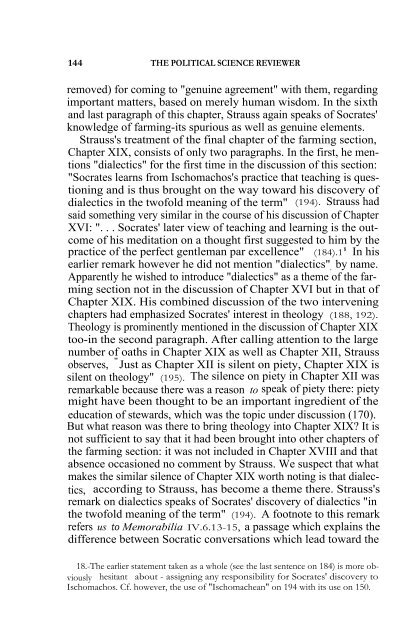Strauss on Xenophon's Socrates Xenophon's Socratic Discourse: An ...
Strauss on Xenophon's Socrates Xenophon's Socratic Discourse: An ...
Strauss on Xenophon's Socrates Xenophon's Socratic Discourse: An ...
You also want an ePaper? Increase the reach of your titles
YUMPU automatically turns print PDFs into web optimized ePapers that Google loves.
144 THE POLITICAL SCIENCE REVIEWER<br />
removed) for coming to "genuine agreement" with them, regarding<br />
important matters, based <strong>on</strong> merely human wisdom. In the sixth<br />
and last paragraph of this chapter, <str<strong>on</strong>g>Strauss</str<strong>on</strong>g> again speaks of <strong>Socrates</strong>'<br />
knowledge of farming-its spurious as well as genuine elements.<br />
<str<strong>on</strong>g>Strauss</str<strong>on</strong>g>'s treatment of the final chapter of the farming secti<strong>on</strong>,<br />
Chapter XIX, c<strong>on</strong>sists of <strong>on</strong>ly two paragraphs. In the first, he menti<strong>on</strong>s<br />
"dialectics" for the first time in the discussi<strong>on</strong> of this secti<strong>on</strong>:<br />
"<strong>Socrates</strong> learns from Ischomachos's practice that teaching is questi<strong>on</strong>ing<br />
and is thus brought <strong>on</strong> the way toward his discovery of<br />
dialectics in the twofold meaning of the term" (194). <str<strong>on</strong>g>Strauss</str<strong>on</strong>g> had<br />
said something very similar in the course of his discussi<strong>on</strong> of Chapter<br />
XVI: ". . . <strong>Socrates</strong>' later view of teaching and learning is the outcome<br />
of his meditati<strong>on</strong> <strong>on</strong> a thought first suggested to him by the<br />
practice of the perfect gentleman par excellence" (184).1 8 In his<br />
earlier remark however he did not menti<strong>on</strong> "dialectics" , by name.<br />
Apparently he wished to introduce "dialectics" as a theme of the farming<br />
secti<strong>on</strong> not in the discussi<strong>on</strong> of Chapter XVI but in that of<br />
Chapter XIX. His combined discussi<strong>on</strong> of the two intervening<br />
chapters had emphasized <strong>Socrates</strong>' interest in theology (188, 192).<br />
Theology is prominently menti<strong>on</strong>ed in the discussi<strong>on</strong> of Chapter XIX<br />
too-in the sec<strong>on</strong>d paragraph. After calling attenti<strong>on</strong> to the large<br />
number of oaths in Chapter XIX as well as Chapter XII, <str<strong>on</strong>g>Strauss</str<strong>on</strong>g><br />
observes, " Just as Chapter XII is silent <strong>on</strong> piety, Chapter XIX is<br />
silent <strong>on</strong> theology" (195). The silence <strong>on</strong> piety in Chapter XII was<br />
remarkable because there was a reas<strong>on</strong> to speak of piety there: piety<br />
might have been thought to be an important ingredient of the<br />
educati<strong>on</strong> of stewards, which was the topic under discussi<strong>on</strong> (170).<br />
But what reas<strong>on</strong> was there to bring theology into Chapter XIX? It is<br />
not sufficient to say that it had been brought into other chapters of<br />
the farming secti<strong>on</strong>: it was not included in Chapter XVIII and that<br />
absence occasi<strong>on</strong>ed no comment by <str<strong>on</strong>g>Strauss</str<strong>on</strong>g>. We suspect that what<br />
makes the similar silence of Chapter XIX worth noting is that dialectics,<br />
according to <str<strong>on</strong>g>Strauss</str<strong>on</strong>g>, has become a theme there. <str<strong>on</strong>g>Strauss</str<strong>on</strong>g>'s<br />
remark <strong>on</strong> dialectics speaks of <strong>Socrates</strong>' discovery of dialectics "in<br />
the twofold meaning of the term" (194). A footnote to this remark<br />
refers us to Memorabilia IV.6.13-15, a passage which explains the<br />
difference between <strong>Socratic</strong> c<strong>on</strong>versati<strong>on</strong>s which lead toward the<br />
18.-The earlier statement taken as a whole (see the last sentence <strong>on</strong> 184) is more obviously<br />
hesitant about - assigning any resp<strong>on</strong>sibility for <strong>Socrates</strong>' discovery to<br />
Ischomachos. Cf. however, the use of "Ischomachean" <strong>on</strong> 194 with its use <strong>on</strong> 150.

















